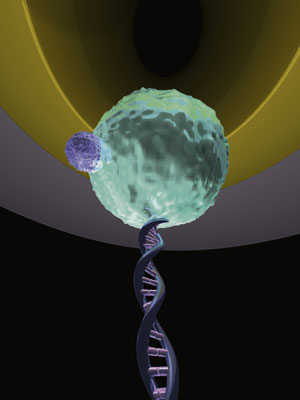Scientists of the department bionanoscience of the faculty of Applied Sciences have developed a new instrument to measure the torque in individual DNA molecules.
“At last it has become straightforward to measure torque with magnetic tweezers!” Professor Nynke Dekker proudly proclaims on her personal web page. Dekker, Dr Jan Lipfert, the chief author, and two other colleagues described their ‘magnetic torque tweezers’ last month in the scientific journal Nature Methods. This novel instrument allows the researchers to measure the torsional stiffness of DNA In the magnetic torque tweezers, a single DNA molecule is attached to a glass plate and a magnetic bead. Using magnets, forces are applied to the bead, and hence to the DNA. A video microscope is then used to analyse the position and rotation of the magnetic particle, and from this the amount of torque stored in the DNA is derived.
Knowledge about the forces and torques that DNA can accommodate are important for better understanding the functioning of DNA, such as, for instance, the way in which the DNA is being copied and repaired inside the cell. “But using such a mechanical approach to study molecules is also interesting if you want to test small DNA-based molecular devices,” Dekker adds.
The new instrument has demonstrated that DNA is more rigid when covered with DNA-binding proteins employed in its repair.
The measurement of torque is one of a number of DNA-bioanalysis breakthroughs made by the department of bionanoscience. In March of last year the group published an article in Nature Physics about a setup that allowed them to exercise forces at any location on a DNA molecule by pulling DNA through a small hole (with a diameters ranging from 10 to 100 nanometres), as a low voltage was applied to it.
Dr Jan Lipfert et al. ‘Magnetic torque tweezers: measuring torsional stiffness in DNA and RecA-DNA filaments’, Nature Methods, October 17, 2010
Na een dag vol onderhandelingen ging het college van bestuur dan toch door de knieën, schrijven de actievoerders in een anoniem persbericht. “Men zal samen naar Den Haag trekken, het bsa wordt onder de loep genomen en voortaan zullen alle besluiten volgens het Gronings harmoniemodel worden genomen.”
Eind gistermiddag sloten ze een compromis met collegevoorzitter Sibrand Poppema. Die weigerde in te gaan op de belangrijkste eis van de studenten – geen bsa – maar beloofde wel de maatregel in 2012 met de universiteitsraad te evalueren. Ook gaat de universiteit eerstejaars beter begeleiden en zal ze in Den Haag lobbyen tegen bezuinigingen op het hoger onderwijs.
Met de deal op zak werd de actie beëindigd, en rond vijf uur kon iedereen weer naar huis. Ook collegevoorzitter Poppema, waarover het gerucht ging dat hij de hele dag zou zijn gegijzeld. “De grootst mogelijke onzin”, zegt Poppema in universiteitsblad UK. “Ik kon op elk moment weg.”



Comments are closed.